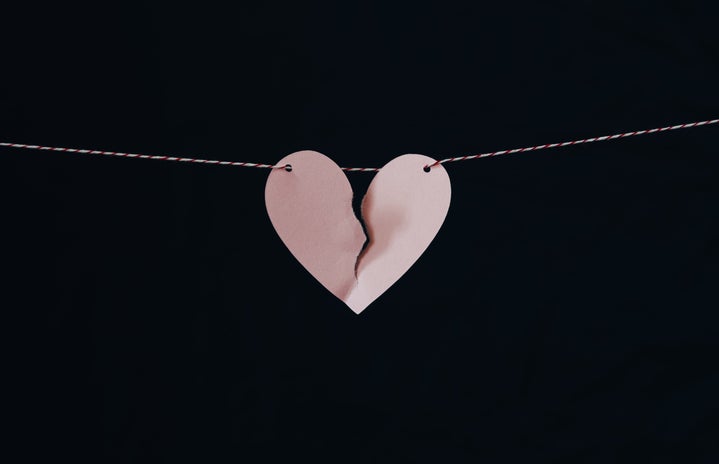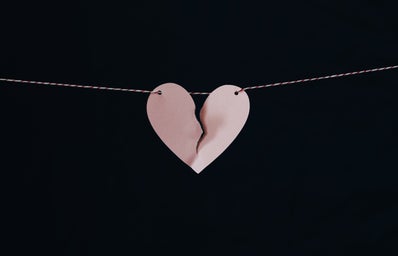Heartbreak is messy and painful. There’s no one-size-fits-all prescription to relieve the pain, no expert guide with tried and true methods. When my high school boyfriend broke up with me the summer before university, I felt defeated and alone. I had never experienced heartbreak before, so when my family and friends suggested I make myself busy, I followed their advice. I threw myself into work and friendships, made appearances at parties, and flirted with new boys. Eventually the hurt faded and I moved on.
But when the first boy I met at university drifted out of my life, suddenly I was back at square one. In trying to get over this boy, I realized an awful truth: sometimes the people you don’t date leave you the most heartbroken. How do you get over someone who was never yours to begin with? How do you move on from someone who never even saved you as a contact in their phone? You may have talked to them, gone on a few dates, maybe even slept with them, but you never met their parents or hung out with their friends. I was left pondering these questions, trying to figure out why I couldn’t get over boys from dating apps the same way I moved on from the boy who actually broke up with me. In my search for an answer, I learned that understanding the way we build relationships can influence how we cope with losing them.
Attachment and attraction are highly influenced by biological factors. For example, having sex causes a chemical release of oxytocin and dopamine, feel good hormones associated with lust and attraction. The chemicals that create strong feelings of satisfaction and pleasure when you orgasm are the same ones that are released when you listen to your favourite song. The effect is addictive, and the same way you might want to listen to a song on repeat, you can begin to crave a person’s company, as well as the chemical reward that spending time with them brings you. When a relationship ends, your brain has to learn to cope without that positive stimulation and you enter an emotional withdrawal. Unfortunately, the chemical reactions in your brain do not account for the type of relationship you share with someone, making it so difficult to move on from a temporary fling. On a psychological level, hope is a big contributing factor. Hope is emotional goal setting, a desire to achieve something. Though chemicals may create feelings of attachment, hope is what leads you to getting hurt. It blurs your ability to think logically or see situations for what they are. For example, it might encourage you to hold on to hope that a hook-up could lead to something more, or that a guy really does want a committed relationship even though he’s told you otherwise.
With all that said, how do you move on? How do you work against biology and psychology and become unattached from this person? Thankfully, attachment is not solely influenced by chemical reactions in our bodies. If you feel that your best friend’s advice doesn’t apply because it’s not a true “breakup”, here are my two best pieces of advice for moving on from someone you never dated: validate your feelings and critically analyze your relationship with this person.
It is normal to feel foolish for being upset over something that didn’t come to fruition, but judging yourself harshly and denying your emotions only prolongs the healing process. It’s okay to mourn brief relationships. Though you may not have lost a tangible, committed relationship, the loss of possibility is still loss. Your feelings are valid, and you don’t have to prove them to anyone else. It’s okay to miss them, to re-watch their snap story or write them messages you’ll never send, but it’s not fair to beat yourself up for being human.
Beyond actively validating your emotions, it’s important to analyze your thoughts about this person. Consider how you think or dream about them. Is the version of them in your head accurate? Often, we project our thoughts and desires onto those we care about, creating false perceptions that we view as truth. Do you see them for who they truly are, or do you cling to an altered version of them? Coming to the hard but necessary realization that someone is not as perfect as you had believed is a big step toward changing your mindset and moving forward.
It’s a tragic reality that people who spend very little time in our lives can leave such a lasting impression upon us, that random hook-ups and short talking phases can leave us reeling for a while. Understanding and reckoning with biology, hope and your own emotions is difficult, but each shares a role in the process of moving on and healing. If there’s one thing you take away from this entire process, I hope it is to allow yourself grace and forgiveness. Healing from heartbreak will look different for everyone, and that is okay. Most of all, appreciate yourself as a singular entity that is able to love and to be loved, and is deserving of an unconfusing and thoughtful love affair.


